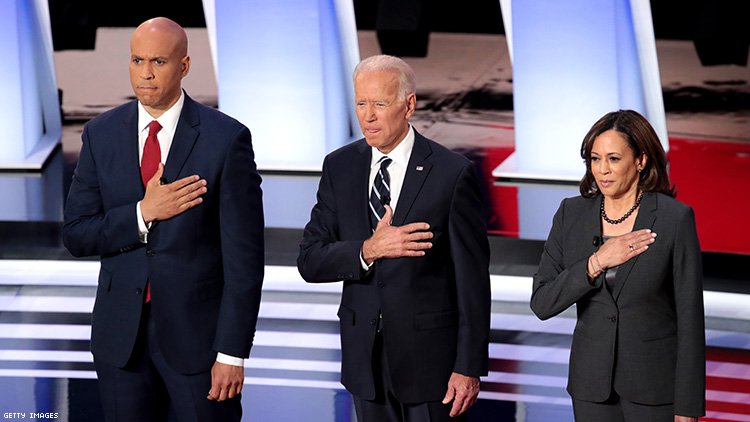August 9, 2019 - HIV Plus Magazine
By Jacob Anderson-Minshall
So far, several of the top 2020 Democratic hopefuls responded to an HIV-related survey about their policy plans, ideals, and innovative ideas.
The next president of the United States will represent over a million Americans living with HIV, and their administration will fund resources for the 40,000 people newly diagnosed with the virus each year. They'll be trying to live up to some of the aggressive (but some say unattainable) HIV goals, as well, like ending AIDS by 2030.
HIV advocates have long requested that presidential candidates share their HIV policy plans, though they haven’t always gotten a response. But things have begun to change, and six of the top 2020 Democratic nominee hopefuls responded to an HIV-focused survey spearheaded AIDS United, along with other members of the ACT Now: End AIDS Coalition (which is made up of GMHC, Housing Works, Positive Women’s Network-USA, Prevention Access Campaign, Sero Project, Transgender Law Center, The U.S. People Living With HIV Caucus, and 41 other community-based organizations).
The survey was sent to every major presidential candidate, including re-election seeking President Trump. So far, responses have been returned from several Democratic candidates: Cory Booker, Pete Buttigieg, Kamala Harris, Beto O’Rourke, Bernie Sanders, and Elizabeth Warren.
Not surprisingly, many of the candidates’ responses are similar. They all support the Equality Act, as well as providing more services for those living with or at-risk of HIV who are incarcerated, more funding for programs like PREPFAR and specific HIV prevention efforts like PrEP, and returning the nation to a leadership role on the world stage when it comes to HIV. Each condemns HIV and LGBTQ discrimination, the ban on those living with HIV enlisting or deploying in the Armed Forces, barriers to reproductive health care, and denying health care to people based on their immigration status. Many specifically call health care (and housing) “a human right.”
Where the candidates differ is in specific proposals and their grasp of the issues facing those living with HIV (not all of them are well versed in U=U or TasP, for example). There was also a difference in language. For example, both the Sanders and O’Rourke campaigns answered questions in the third person (e.g. “Beto will vote for…”) while the others answered in the first person (e.g. “As president, I will…”). Some seem to think maintaining current funding levels is enough, while others argue for dramatic increases for programs impacting those with HIV.
Continue reading at HIV Plus Magazine for the summaries of each candidate.






